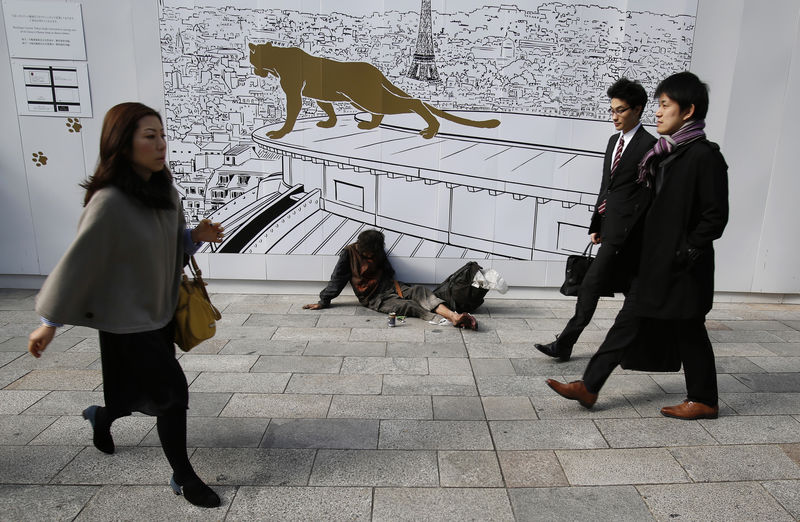By Leika Kihara
TOKYO (Reuters) - Japan's economy shrank more than initially reported in the third quarter on declines in business investment, data showed on Monday, surprising markets and backing premier Shinzo Abe's recent decision to delay a second sales tax hike.
The hit from an April sales tax hike turned out to be bigger than expected, the revised gross domestic product data indicated, underscoring the challenges Abe and the Bank of Japan face in pulling the world's third-largest economy sustainably out of deflation.
The revision to an annualised 1.9 percent contraction from a preliminary 1.6 percent fall confirmed Japan slipped into recession and confounded a Reuters poll projecting a 0.5 percent contraction.
Abe, who has called a snap election for Sunday, hopes voters will agree that his stimulus policies and delay in the planned second tax hike next year will revive a sputtering economy. Media polls predict a landslide victory for his coalition.
The "harsh evidence for Abenomics," shows that "tame growth in wages in particular is likely to drag on private consumption and broader economic activity," said Takeshi Minami, chief economist at Norinchukin Research Institute.
Adding to the gloom, manufacturers' confidence slid in December and is expected to deteriorate further, the Reuters Tankan showed, highlighting the patchy nature of the recovery.
The key factor behind the GDP downgrade was a 0.4 percent decline in business investment, revised from a preliminary 0.2 percent fall. Analysts had expected capital spending to be revised up after an upbeat survey last week.
But spending was probably weak for small firms not included in the survey's sample base and, coupled with other data used in revising GDP, led to the downward revision, a government official told reporters.
An increase in Japan's sales tax to 8 percent from 5 percent in April hit household spending and clouded the outlook for "Abenomics," a mix of aggressive monetary expansion, fiscal stimulus and structural reforms aimed at ending economic stagnation.
POLICY CHALLENGES
The policies have been an initial success, brightening household and corporate sentiment by boosting stock prices and weakening the yen. Despite the two straight quarters of contraction, the size of Japan's economy is still 1.4 percent bigger than before Abe seized power in late 2012.
Abe's decision to delay the second tax hike to 10 percent by 18 months until April 2017 eased concerns about the outlook for consumer spending, which makes up 60 percent of GDP.
But the recession has also shown that Abe's stimulus policies have not been enough to strengthen the underlying economy even after two years in office, as companies remain hesitant of boosting wages and capital spending.
The frail business sentiment in the monthly Reuters Tankan is another bad sign for the BOJ as it suggests further weakness in the central bank's quarterly tankan survey, which had been forecast to stay largely flat in the fourth quarter.
The BOJ's massive stimulus, adopted in April last year and expanded in October, relies heavily on psychology to accelerate inflation to the bank's 2 percent target. A weak result in the BOJ tankan, due on Dec. 15, could cast further doubt on the central bank's rosy economic forecasts and keep it under pressure to expand stimulus again, analysts say.
The BOJ is widely expected to keep policy unchanged and maintain its upbeat view of the economy at its next decision on Dec. 19.

Still, many economists expect Japan to resume moderate growth this quarter on signs corporate and household spending are recovering from the tax hike. Exports are also showing signs of bottoming out after remaining disappointingly weak despite a sharply weaker yen.
(Additional reporting by Tetsushi Kajimoto; Editing by Shri Navaratnam)